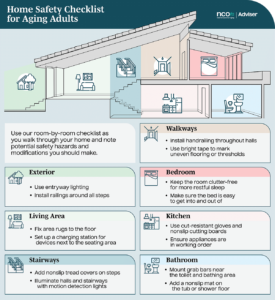As the calendar flips to a new year, it’s time to embrace resolutions that genuinely matter. While many focus on personal goals or professional aspirations, one resolution often goes unnoticed: checking up on our loved ones. This simple act of caring can make a difference in their lives. Imagine stepping into their homes, armed with a checklist for a living conditions review, ready to ensure their comfort and well-being.
From examining their food supply to tidying up the fridge and freezer, reviewing medications, and even assessing their safety measures in the home, this guide will help you start the year right by taking care of those who have cared for us.
Living Conditions Review Checklist
As we age, our abilities and needs change, so regularly evaluating and addressing any potential hazards in the homes of our older loved ones is helpful. By conducting a living conditions review, we can identify potential areas of concern and take necessary actions to help prevent accidents or injuries.
Nutritional Needs
The first aspect of a living conditions review is the assessment of food and nutrition. Our dietary needs may change as we age, and ensuring that our older loved ones receive proper nourishment is beneficial.
What you can do:
- Check expiration dates on food items
- Stock up on healthy food options
- Ensure access to clean drinking water
- Encourage a balanced and varied diet
Medication Review
Another crucial aspect of a living conditions review is reviewing medications, which should only be done by a family member or friend. As we age, we may require more medications to manage various health conditions.
What you can do:
- Check and organize medication schedules
- Create a medication schedule or reminder system
- Discard expired or unused medications
- Monitor correct medication usage
- Ensure that all medicines are easily accessible and properly stored
Emotional Well-being
In addition to addressing physical aspects of living conditions, it’s also essential to consider the emotional well-being of our senior loved ones.
What you can do:
- Spend quality time with each other
- Engage in activities they enjoy
- Ensure a supportive network of friends and family
- Encourage them to maintain hobbies and interests
- Seek companionship services if you’re not readily nearby or available
Safety Measures
It’s crucial to review and update safety measures within the home regularly. Our balance and mobility may decrease, making us more susceptible to accidents.
What you can do:
- Confirm that smoke detectors, carbon monoxide detectors, and fire extinguishers are functioning properly
- Check for loose rugs, cluttered areas, or any other potential trip and fall risks, and address them promptly
- Ensure all areas of the house have adequate lighting, especially hallways and stairs
- Install grab bars in the bathroom, particularly near the toilet and in the shower or tub. Consider using non-slip mats as well
- Make sure everyday items, especially in the kitchen, are within easy reach to prevent straining or potential falls
- Securely fasten handrails if the house has stairs, and consider installing a chair lift if navigating the stairs is challenging
- Ensure the heating and cooling systems are working correctly to maintain a comfortable temperature in the house
When assessing your loved one’s safety in the home, you can also consult the National Council on Aging’s comprehensive guide and checklist below. This resource provides home safety tips and suggests useful devices to ensure your loved one can continue aging in a secure and comfortable environment.

Communication
In addition to conducting a thorough living conditions review, keeping communication open is essential. It can be challenging for older adults to ask for help, so being proactive in checking in and discussing concerns is important.
What you can do:
- Have regular check-ins or scheduled phone calls to stay connected.
- Encourage open and honest communication about their living conditions and how they are feeling
- Be proactive in identifying potential issues
- Ensure they have access to a phone or other means of communication in an emergency
- Create an emergency plan and ensure the senior individual knows what to do in an emergency
- If they are living alone, consider implementing a check-in system through a medical alert device or mobile app
Overall, a living conditions review is a crucial step in ensuring the health and well-being of our loved ones. By regularly assessing and addressing their living environment, we can help them maintain a high quality of life and age gracefully. As the new year begins, let’s prioritize caring for our family members.
The Villi team is here to help.
Do you need help with a loved one? Then consider Villi’s homemaker and companionship services. Our team of friendly, compassionate Companions takes great pride in serving people in their community who need light assistance with daily chores, some company and conversation, or convenient transportation for errands, appointments, or trips to the store.
Explore our services to learn more about our:
- Homemaker and companionship services
- Easy-to-use scheduling platform
- “Best Value” service pricing
- Only 1-hour service minimum
Sign up in seconds to enjoy free 24-hour access to our on-demand scheduling platform, where you can view our team of vetted compassionate companions.
If you have questions about our services, please call 1-844-624-5646 to speak to one of our caring service Advisors.
Resource links:
National Institute on Aging – Aging in Place: Growing Older at Home
https://www.nia.nih.gov/health/aging-place/aging-place-growing-older-home
US News – The Importance of New Year’s Resolutions for Older Adults
https://health.usnews.com/health-care/for-better/articles/2018-12-12/why-seniors-should-make-new-years-resolutions
https://www.ncoa.org/adviser/medical-alert-systems/support-for-older-adults-living-alone/
National Council on Aging – Home Safety for Older Adults
https://www.ncoa.org/adviser/medical-alert-systems/home-safety-older-adults/
